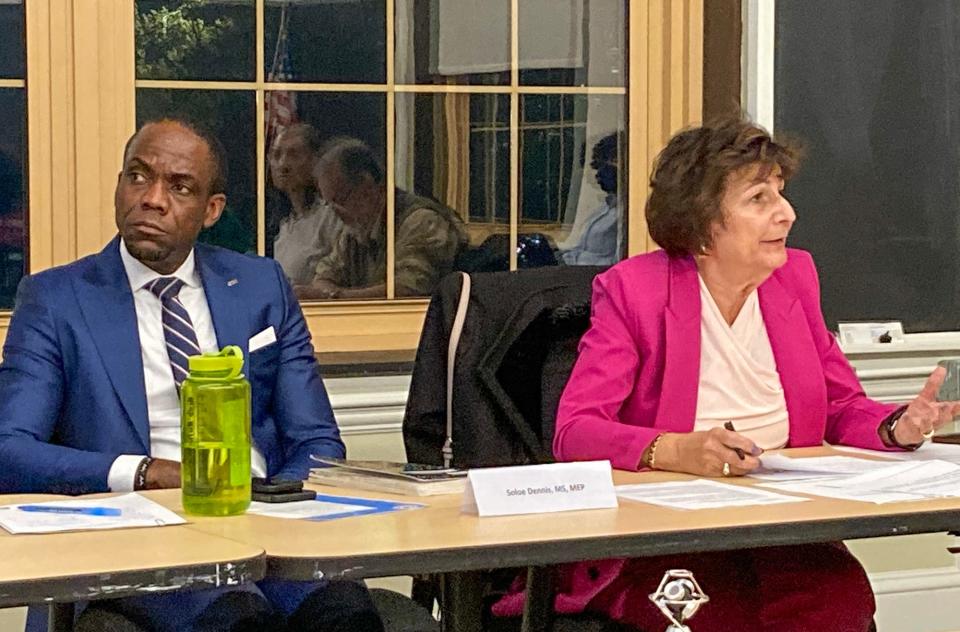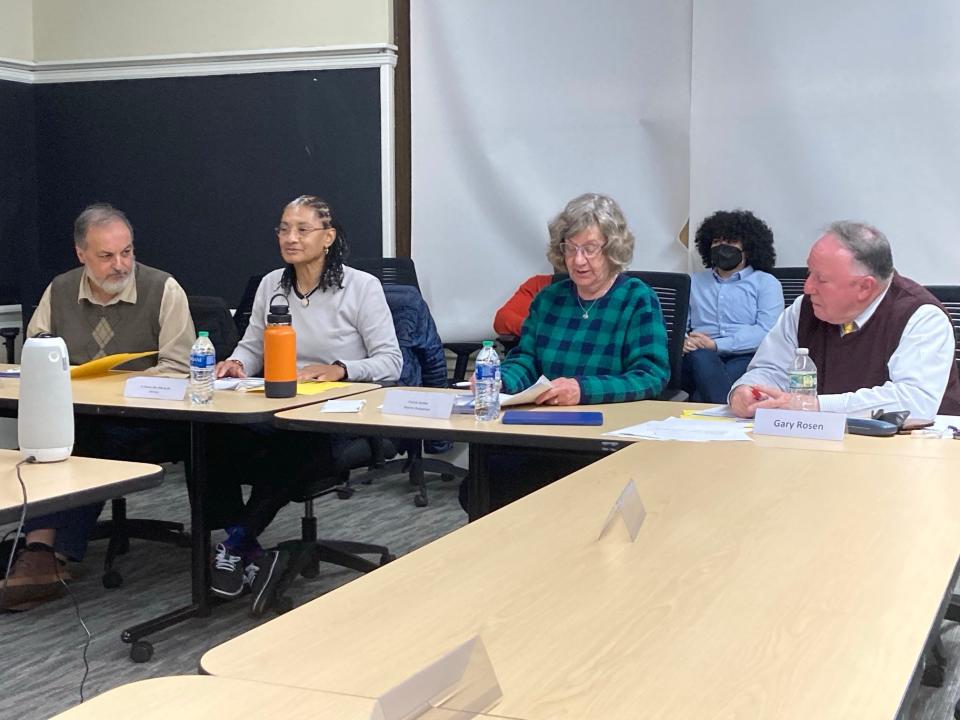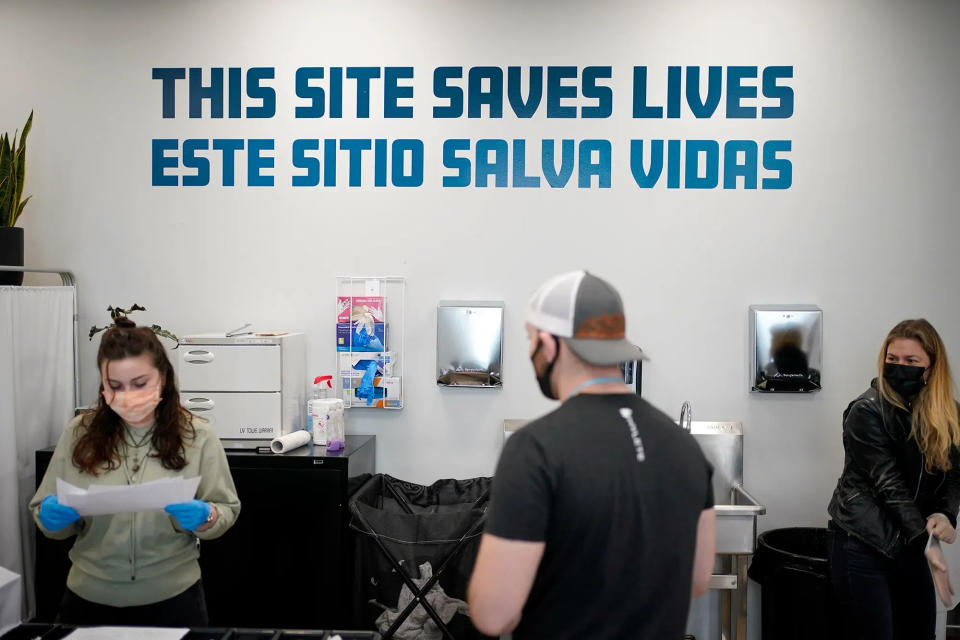Worcester Board of Health votes to support opening safe injection site. What happens now?
WORCESTER — The city's Board of Health has taken the first step toward potentially creating an overdose prevention center, also known as a safe injection site, in Worcester.
The Board of Health voted 4-0 Monday night to approve creation of a such a center as a pilot program, pending state approval.
It’s unclear what the next legal and political steps will be to bring a center to the city. It’s also unclear if sign-off is needed by City Manager Eric D. Batista and the City Council before a center could come to Worcester.

City Councilor Etel Haxhiaj posted a message Monday night on X, formerly Twitter, that said the council has the final say on whether to bring a center to Worcester.
District 4 City Councilor Luis Ojeda, who chairs the council's public health subcommittee, said he needs time to look at the pros and cons of the centers to gain a better understanding before deciding whether to support them.
A spokesman for Batista said the city manager was unavailable for an interview. Batista's office issued a statement that said the city is working on a report requested by City Council and the city will take no action until the state gives further guidance.
“The administration is working on a report for City Council in response to Councilor Haxhiaj’s order relative to the data on Overdose Protection Centers (OPC) and expects it to be transmitted in the near future," the statement reads.
It continued: "No action will be taken on the potential operation of an OPC in the City of Worcester until further guidance is provided by the State of Massachusetts. At such time, further conversations will be had among City officials, City Council, health providers, stakeholders, and the community at large.”
'We have the authority to do this'
Board of Health member Gary Rosen, a former Worcester city councilor, said moments before Monday's vote that the board no longer serves just an advisory role, taking on powers bestowed on it from a past city council vote.
"The city manager does not oversee the four of us," said Rosen. "Tonight we speak up...We have the authority to do this."
Rosen added the board's support for a center would take pressure off the City Council as it considers the issue. He also noted he supports the board working with Batista and the council.
"Let's leave tonight to let the City Council and the city manager know where the Board of Health is coming from. That we support a pilot program," said Rosen.
Only two in the U.S.: Some objections
There are only two of the facilities operating in an official capacity in the U.S., both in New York City, with another expected to open in Providence this summer.
Objections to the centers have reportedly focused on those who believe they enable drug users. Locating them is also a challenge, as some neighborhoods don't want them in the vicinity.
At overdose prevention centers, medical professionals monitor users while they’re taking illegal drugs that the users bring into the facility. Preventing overdose deaths and getting users into treatment are the goals. Treatment options come into play only if the person wants them.
Prior to the vote, the board heard from doctors, advocates and social service providers that the centers reduce the number of drug overdose deaths. In fact, they said, there hasn’t been a single death at hundreds of the centers located worldwide.
Federal law: Centers are illegal
Federal law deems the centers illegal and Massachusetts has not approved them. However, a top state public health official said cities and towns can establish the centers without state lawmakers passing a bill to legalize them.
Deirdre Calvert, director of the Bureau of Substance Addiction Services at the state Department of Public Health, delivered that message to the board before its vote. Several pending bills are at the Statehouse that call for bringing the centers to Massachusetts.
“If a municipality wants to go forward, then the Department of Public Health is behind them,” said Calvert.
Studies: Centers reduce deaths/no increased crime

Brandon Marshall, chairman of epidemiology at the Brown University School of Public Health, shared studies with the board that showed the centers cut overdose deaths, result in more users accessing treatment and don't result in higher crime rates around the centers.
A 2011 study led by Marshall and published in Lancet showed the fatal overdose rate fell 35% in a downtown section of Vancouver after a supervised injection site opened in that area of the city, compared to a 9.3% decline citywide. Another study published last month in the Lancet showed a 67% decline in overdose deaths between 2017 and 2019 in Toronto neighborhoods where nine safe injection sites had opened.
In the International Journal of Epidemiology, a study estimated probabilities of overdose, abscesses and emergency department visits over 12 months among people who used an overdose prevention center, compared to those who used other harm reduction services. Findings included:
● Overdose deaths fell 3%, compared to 1% who used other services
● Abscesses declined 14%, compared to 3% who utilized other services
● Emergency department visits dropped 41%, compared to 17% who used other services. Marshall noted this last comparison to highlight how the centers put less strain on emergency rooms and hospitals.
Another study of 621 people that used supervised injection facilities in Vancouver found 261 (42%) enrolled in some form of treatment after 24 months of follow-up.
In addition, a 2023 study in The Journal of the American Medical Association looked at the two centers in New York City that opened in 2021, plus 17 sites that provide syringes. It found no significant increases in crimes recorded by the police or calls for emergency service in the neighborhoods where the two centers are located. Findings included:
● Felonies rose at both injection sites by 21%, compared to 18% at the locations that provide syringes. The percentages are consistent with the general rise in crime in New York City during the study period (Jan. 1, 2019 through Dec. 31, 2022), an increase predominantly driven by property crime.
● Around the two prevention centers, the monthly mean of 911 calls for crime and other emergencies decreased 30.1%, while remaining approximately flat in the syringe locations.
● 911 calls for medical emergencies decreased around the prevention centers by 50.1%, compared to an 8.6% drop around the locations that offered syringe services.

Data: Opioid crisis in Worcester
Dr. Matilde Castiel, Worcester's commissioner of health and human services, showed the board data that highlights the opioid crisis in Worcester.
● A total of 141 in Worcester died from an opioid-related overdose in 2022, the highest annual number going back since 2012
● A 17.8 % spike from 2021 to 2022 in opioid-related overdose deaths in Worcester, from 281 deaths in 2021 to 331 in 2022
● Worcester's rate of deaths (79.62 per 100,000 people) exceeds Boston's rate (54.09 per 100,000 people)
Passionate pleas
Several attendees at Monday's meeting shared accounts, determined to show that Worcester needs these centers. One came from Eileen Lovejoy, whose son died in 2013 from a heroin overdose.
"I believe if he was in an overdose prevention center, he could still be here today," said Lovejoy.
Dr. Erik Garcia shared his epiphany with the board. Garcia is an internal medicine physician at UMass Memorial Health who works on the hospital's Road to Care mobile van that provides services to the city's residents with substance use disorders.
Garcia said he previously opposed safe injection sites because "they were a step too far," but changed his thinking when he considered the prospect of his daughter, who lives in Oregon, having an opiate use disorder.
"I could not sleep knowing that at any point she could be behind a dumpster or in a building or in a room with other people without the medical capacity to help her. That was it for me," he said.
"We need to do this as a group without asking for permission from everyone in the city. Just like the outreach van does quietly, we can do this in the same way, unobtrusively."
Officials at AIDS Project Worcester told the board before the vote that it supports a pilot spot in Worcester and believes it already offers services and has the professional staff and trust in the community that it could take on the role of a supervised injection site.
Besides the distribution of clean needles and Narcan, the life-saving nasal spray that immediately reverses an overdose, officials at the nonprofit told the board that it collects "residue" from drug users. The residue is tested and reveals the drug's contents including potentially deadly components like xylazine — a potentially deadly animal tranquilizer that is mixed with some street drugs.
"I am very excited by the unanimous vote of the Board of Health has just put forward, and I really hope that it is a sentiment that will be shared by the rest of the politicians in the City of Worcester," El Martinez at AIDS Project Worcester told the T&G moments after Monday's vote. "We are ready. AIDS Project will serve as an organization to take this on and we really feel like it is the best step we could take to combat the mortality rate of overdose in the city."
Contact Henry Schwan at henry.schwan@telegram.com. Follow him on Twitter @henrytelegram
This article originally appeared on Telegram & Gazette: Worcester Board of Health votes to support opening safe injection site

